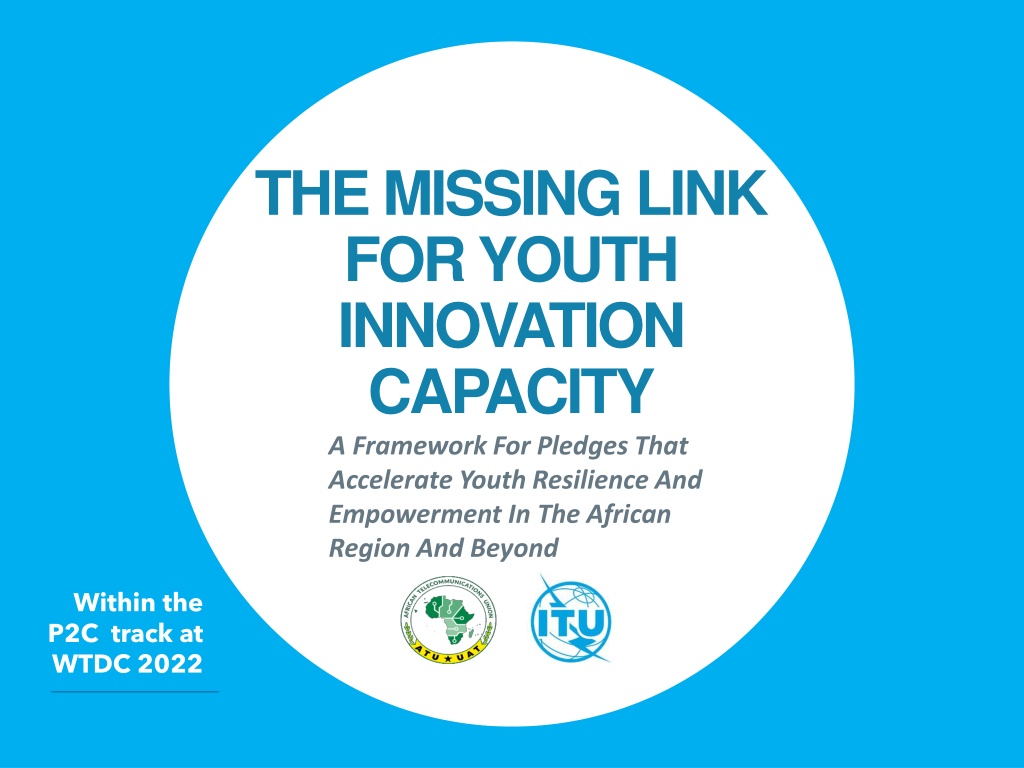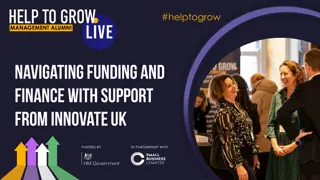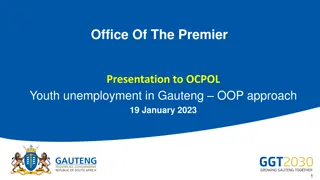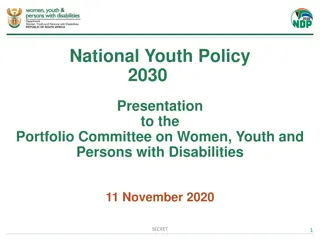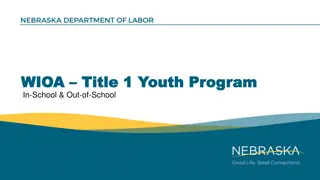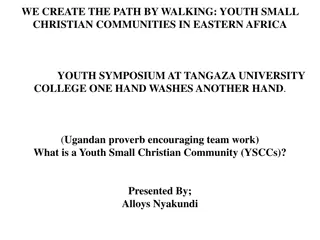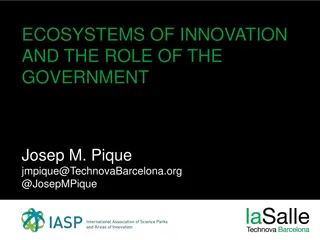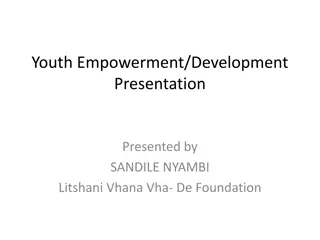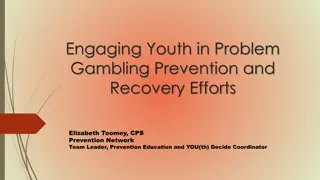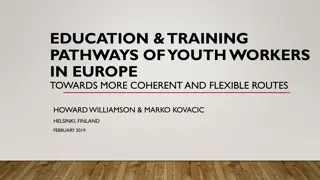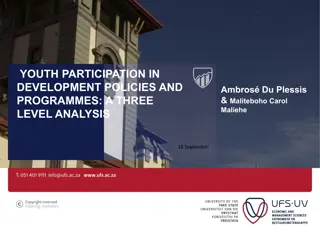Enhancing Youth Innovation Capacity in Africa and Beyond
The missing link for youth innovation capacity lies in addressing gaps hindering young Africans from transforming communities through innovation. With a focus on boosting entrepreneurship, creating sustainable ecosystems, and providing access to markets, the Youth Summit at WTDC 2022 aims to empower youth to drive economic inclusion and social impact. By leveraging targeted initiatives and partnering for impactful pledges, countries can accelerate youth resilience, create job opportunities, and foster sustainable development.
Download Presentation

Please find below an Image/Link to download the presentation.
The content on the website is provided AS IS for your information and personal use only. It may not be sold, licensed, or shared on other websites without obtaining consent from the author. Download presentation by click this link. If you encounter any issues during the download, it is possible that the publisher has removed the file from their server.
E N D
Presentation Transcript
THE MISSING LINK FOR YOUTH INNOVATION CAPACITY A Framework For Pledges That Accelerate Youth Resilience And Empowerment In The African Region And Beyond Within the P2C track at WTDC 2022
Background and Rationale In partnership with ITU and others, ATU ran innovation challenge experiments in 2020 and 2o21 to discover both the opportunities and challenges faced by young African innovators in their quest to transform their communities through innovation. Africa is home to nearly 363 million young people, and this is expected to double by 2050 (ILO) 15 to 20 million educated youth will join the African workforce every year for the next three decades, compounding the existing problem. Based on lessons learnt from the joint innovation challenges, and ITU s work in this domain, the following gaps were identified as inhibiting youth talent in their innovation journey. The full potential of young Africans remains unrealized as unemployment, working poverty, lack of opportunities, and gender inequalities continue to be significant obstacles to young people accessing decent jobs. 1) Insufficient readiness of the education system to foster a tech- driven entrepreneurial culture allowing young Africans to take their ideas to market Lack of appropriate support services to provide the youth with resources and meet their needs Lack of access to local demand to test and pilot innovation Lack of access to regional and global markets to scale up their innovation Inadequate policies, strategies and synergies in the ecosystem to create a sustainable and competitive environment 2) 3) 4) Several obstacles are inhibiting the innovation journey of young Africans as they take their ideas to the market and create economic inclusion. 5) An innovation journey to take ideas to market and create economic inclusion (gaps based on stage of the journey) As a result, talent is unfulfilled, SMEs are not growing, and social inclusion is affected. Sadly, this problem is not unique to the African continent. 1 5 3 2 4 | 2 2
Addressing Gaps To Boost Youth Innovation Capacity The Youth Summit and Partner2Connect track at WTDC offer an opportunity to guide stakeholders to meaningful pledges to close the identified gaps. Young Africans are increasingly technology savvy and eager to seize opportunities in their communities; however, they struggle in their innovation journey. Targeted flagship initiatives to meet the five objectives below will unleash their potential and close the identified gaps: Through clear objectives aimed at closing the gaps, the P2C pledges can be combined and matched for a more meaningful outcome. Ecosystem Policies, Strategies And Governance For Sustainability Entrepreneurial Universities For Seeding An Innovation Fabric 1 Coordinated flagship initiatives are needed to enable group pledges and create concrete projects using best practices and identified partners. 5 Framework For Boosting Innovation Capacity Through this framework for pledging, countries can have access to resources and detailed blueprints to scale-up implementation and impact. Support Services Provider Network In Urban And Rural Areas For Inclusivity 4 2 Global Market Access To Scale Up Innovation 3 Agile Procurement For Early Success Of Startup/SMEs Designing impactful projects with SMART KPIs can deliver better synergies and partnerships to address the gaps when resources are limited. Pledging under these five objectives that build the innovation capacity of countries will accelerate youth resilience and empower them to get decent jobs, create startups/SMEs, and contribute to their communities' development. | 3 3
Objective #1 - Updating To Entrepreneurial Universities The African region has more than 1200 universities, and many are struggling to support talent to commercialize their ideas or prepare them for decent private-sector jobs. In a fast-changing technological environment, there is a need to ensure that talent benefits from a strong collaboration between the private sector, academia, government, and partners. Initiatives under this objective will upgrade existing universities to focus on talent readiness to innovate, conduct tech-driven research, commercialize innovation and develop an entrepreneurial culture with the right mindset. Few technical universities offer entrepreneurial teaching, they are unable to commercialize their research, and the talent is not ready with the practical education needed to create digital innovation. To address the readiness of the education system and foster a tech-driven entrepreneurial culture allowing talent to take their ideas to market, the following pledges can be made: Meet St Joseph University -Tanzania To ensure appreciable contribution to the socio- economic transformation of Tanzania, St. Joseph University has put in place an Innovation Technopreneurship Acceleration Facility and program as a mechanism to enable SJUIT students and staff to become innovative, enterprising, entrepreneurial, and competitive. Private sector technologies companies can pledge in-kind resources such as technological platforms or internship opportunities, cash contributions, etc. Government can upgrade curriculums that empower the right talent with 21st-century skills Universities can pledge to transform themselves into entrepreneurial universities by building incubators, entrepreneurial programs, collaborative research programs, etc. Donors and partners can pledge to fund the initiative for several universities and countries Others can pledge expertise or resources for this initiative Through this mechanism, SJUIT hopes to contribute appreciably to the development and growth of local industry, employment generation, and socio-economic transformation of its community. St Joseph needs partnerships to offer the best entrepreneurial and research programs to achieve its goal. | 4 4
Objective #2 - Building An Inclusive Support Service Provider Network For talent living in suburban and rural areas, access to support services and resources is limited or often inexistent. These are often insufficient, geographically concentrated in urban settings, or ineffective. Through developing a support service provider network, a matching of demand and supply, and available resources to fund services, initiatives under this objective will deliver essential services including in rural areas. The scarcity of services for creative talent is fuelling a paradigm that requires new thinking to reach beneficiaries and achieve impact. When entrepreneurs identify incredible opportunities, they need intensive support to take their ideas to market. They need services such as funding, mentorship, specialized training, Intellectual Property protection, and business development. The following pledges will enable the development of a service provider network serving talents regardless of their geographical location: An entrepreneurial support organization pledges to offer specific support services (mentoring, funding, business development, IP, etc.) Meet After school STEM Club for Girls- Cameroon This program from the Visiola foundation mentors and empowers African girls and young women to maximize their potential as leading scientists, technologists, engineers, and innovators. A government can pledge to develop Key inclusive services of mentorship, and funding, which can fuel the services. Donors and partners can pledge to fund the initiative for select communities, regions, or countries. The private sector can pledge specific Corporate Social Responsibility initiatives to achieve more impact. Others can pledge expertise or resources to develop this network. After 5 weeks of an intensive coding boot camp the girls are expected to gain job/internship opportunities. This objective will help establish appropriate funding and service delivery models so that a program like the After-school STEM Club for girls can be sustainable and scalable. | 5 5 .
Objective #3 - Developing Agile Procurement For Startups/SMEs Governments and established organizations increasingly require innovative solutions to provide services to beneficiaries, but this is difficult as procuring such services will require flexible procurements policies and processes. With most organizations requiring ICT enabled services to be productive and competitive, innovative startups and SMEs have a huge potential demand granted they can access the right opportunities. Initiatives under this objective will provide opportunities for startups and SMEs to test their ideas, validate their market opportunities, and grow into viable businesses. Although some countries may have some procurement laws for small businesses, this is often not valid for Tech startups, and existing procurement rules are ineffective. As entrepreneurs seek customers, a transparent and efficientprocurement system helps them land contracts and allows them to test and pilot their solutions before they scale. The following pledges under this objective can support the enabling conditions needed for startups and SMEs to access a needed opportunity in their communities: A government can pledge to develop appropriate policy to support tech startups/SMEs with procurement. Donors and partners can pledge to fund the initiative for select communities, regions or countries. The private sector, international organizations, or public sector entities can pledge to offer procurement programs that guide and offer a chance for Tech startups and SMEs. Organizations can pledge to run innovation challenges that engage innovators in solving critical issues and access procurement contracts. Meet Funworks - Benin Funworks, from MIC Corporation, aims to create educational applications to improve the level of mathematics and physics of high school students. There is a high failure rate in scientific subjects for this student category. To date, they deliver their services with an application called Maths 5eme which is adapted to the African education system. Without further demand from educational system procurement, their idea will be short-lived. Achieving this objective will ensure Startups like Funworks have access to government procurement. | 6 6
Objective #4 Enabling Global Market Access To Scale Up Innovation Many domestic markets are too small for innovators to prosper and compete with global companies. Tech-driven talent needs access to opportunities in other markets to scale. These are typically associations, chambers of commerce, export support organizations, among others. However, when it comes to working with ICTs many of these organizations are not active. By reinforcing linkages and building best practices programs, young talent will be able to seize opportunities for Key sectors and compete regionally and globally. Regional economic communities have the ambition for one digital marketplace, but they often lack Key enabling programs and networks to facilitate regional integration. Innovators need access to international market demand in order to grow their start-ups. There are networks that foster cross-border trade or sectoral opportunity development. Thefollowingpledgescansupport thedevelopment of a mutually beneficial partnership within and between ecosystems to enable talent to scale opportunities: Meet The Virtual Science Lab - Egypt An association from any sector, a chamber of commerce pledges to develop a focus on ICTs for a non-ICT sector. Donors and partners can pledge to fund the initiative for select communities or countries. A government can pledge to develop market access programs or other programs that support the capacity development of associations. A city economic development unit can pledge to make available opportunities to link their city s technology ecosystem resources to other cities or partners. The virtual science lab allows students to conduct many science experiments virtually in an electronic environment, thus avoiding the challenges facing the implementation of these experiments in a real laboratory, whether from the lack of necessary chemicals, or ensuring safety standards for students the laboratory. Despite initial success with such ideas, scaling is slow because of the lack of appropriate mechanisms to connect them to problem and resources owners. Achieving this objective will provide the enabling environment for startups like the Virtual Science Lab to scale up. | 7 7
Objective #5 - Strengthening Ecosystem Policies, Strategies And Governance Despite massive investment in ICTs, entrepreneurship and innovation, many countries are unable to adapt to the fast-changing environment and technological revolutions. Policy experimentation frameworks, system thinking, agile project implementation mechanisms, and novel stakeholder governance models can support stakeholders to navigate the changing technological environment. ITU has developed the Digital Transformation Ecosystem Accelerator (DTEA) blueprint that can offer these benefits. This concept is based on the African Digital Transformation Center project in development in South Africa. Stakeholders operate in silos hindering synergies between initiatives, struggle with implementation and operationalization of policies and strategies, and lack resources to achieve scale. Initiatives under this objective will nurture a multi- stakeholder, multi-sectoral approach to co-create and implement initiatives and policies. Countries are undertaking various policy updates to foster entrepreneurship and innovation. However, these policies are often not holistic; and related programs are not achieving measurable social impact. Establishing key enabling policies, strategies, and ecosystem coordination mechanisms can be achieved with the following pledges: Meet Smart Capita - Tunisia The government pledges to conduct holistic digital innovation ecosystem assessments and develop appropriate policies and strategic enabling roadmap that accelerate national ambition. A public organization can pledge to develop a DTEA based on its scope or mandate. Government or private sector can pledge to co-create specific initiatives under DTEA. Donors can pledge to fund a DTEA or assessment for countries. Smart Capita is the operating entity for Startup Tunisia, which is an initiative from the Tunisian Startup Act, covering legal, investment, and support activities. The vision is to make Tunisia a country of startups offering a favourable ecosystem so innovators can launch and grow their enterprise. The goal is to have: 1000 startups by 2024, 10000 jobs created, and 1 Billion DT turnover revenue. Smart Capita needs multi-stakeholder, multi-sectoral ecosystem development best practices to achieve its ambition. | 8 8
P2C Scope Beneficiaries Primary Beneficiaries: Startups/SMEs Academics institutions with mandate to train and educate young talent Entrepreneurial support organizations such as incubators, accelerators, mentors programs, etc. who support youth with innovation capacity Associations and support organizations in key sectors or specialized to support youth National organizations supporting development of Tech ecosystem and/or SMEs P2C Pledge area: VALUE CREATION: Building digital ecosystems Digital innovation & entrepreneurship Digital economy For more about P2C, visit https://www.itu.int/itu- d/sites/partner2connect/. Secondary Beneficiaries: Youth talent age 18 35 seeking to leverage opportunities with technology in their community to create socio- economic impact Policymakers seeking to accelerate digital transformation and achievement of SDGs | 9
Key Takeaways The full potential of young people remains unrealized, and five critical obstacles are inhibiting youth resilience and empowerment in countries. Lack of programs to access global market and scale up innovation Lack of services and resources for Innovation Lack of access to local demand to test solutions Inadequate policies, strategies and synergies Inadequate readiness of education System Countries can seize five opportunities to boost their innovation capacity to ensure talent is fulfilling their dreams. Strengthening ecosystem policies, strategies and governance Enabling global market access to scale up innovation Building an inclusive support service provider network Developing agile procurement For startup/SMEs Build entrepreneurial universities Through these five objectives, P2C pledges can be combined and matched for more meaningful outcomes for beneficiaries. Pledge 1 Pledge 1 Pledge 1 Pledge 1 Pledge 1 Pledge 2 Pledge 2 Pledge 2 Pledge 2 Pledge 2 Pledge 3 Pledge 3 Pledge 3 Pledge 3 Pledge 3 Pledge x Pledge x Pledge x Pledge x Pledge x Through detailed blueprints, pledges can be effortlessly transformed into concrete projects after WTDC. Five workgroups to define blueprints and implement projects based on SMART KPIs | 10 10
How To Engage And Implement This Concept Steps Submit your pledge and attend a pre-event : Assess your goals and overall objective: Submit the pledges on behalf of a group or contact the secretariat for support. Attend the pre-event on April 20 to commit or hear from others. Select the objective that can benefit your ecosystem and become a champion to own and drive the outcome for your community. Attend P2C events to have your pledge heard: Explore your pledge and other stakeholders need to co-pledge on the initiative: Attend the P2C events at the Youth Summit or during WTDC. Identify stakeholders you need for a coordinated pledge for your objectives (.e.g., academia interested, incubator accelerator, operators, etc.), and share the concept note to engage them in the process. 6 Next step after WTDC: Join a working group on the objectives to help operationalize the pledges. Build your pledge and validate: Share the early commitment or discussion with the secretariat at innovation@itu.int to help structure the pledges with narratives and support coordination on your behalf. Join the conversation at the https://bit.ly/missing- link-youth-innovation for help. | 12
Key dates The following resources can be explored for more information: June - Youth Summit / Innovators/private sector dialogue and pledges ATU ITU Innovation Challenges 2020 ATU ITU Innovation Challenges 2021 Global Innovation Forum 2020 Regional Innovation Forum for Africa: Regional collaboration and partnerships; An innovation journey story Global Innovation Forum 2021 Entrepreneurial Universities; Tech Entrepreneurship and Key Sector Development WTDC P2C track Government pledges . Partners Logo | 13 13
